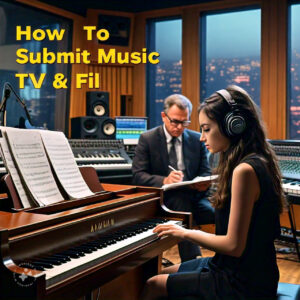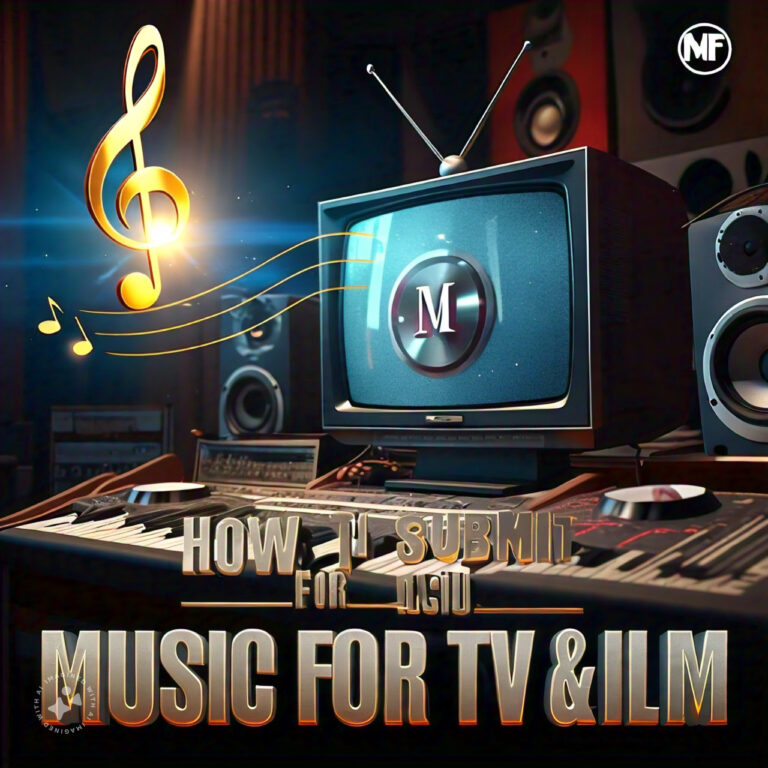Are looking for a perfect way to submit your music for Tv & Films project?, We have you cover, Here in this blog post we are going to give you 10 tips on How To Submit Music For TV & Film.
Hey fellow songwriters! If you’ve ever dreamed of hearing your music on the big or small screen, you’re in the right place. As someone who’s licensed dozens of tracks for TV and film, I’m here to share the hard-won lessons I’ve learned along the way. This ain’t gonna be a fluffy pep talk; we’re diving deep into the nitty-gritty so you can land those placements and get your music heard by millions.
Understanding the Industry: A Primer
Let’s face it, the music licensing world can feel like a maze. But once you know who’s who and what they do, it’s a lot less intimidating.
- Music Supervisors: These are your VIPs. They’re the folks in charge of finding the perfect music for each scene. Build relationships with them, but remember, they get bombarded with submissions. Your music needs to stand out.
- Music Libraries: Think of these as giant catalogs of music. They often have pre-existing relationships with music supervisors, so getting your tracks into a reputable library can be a huge win.
- Licensing Agencies: These pros handle the legal side of things. They negotiate fees and contracts, so you can focus on making awesome music.
You’ll also need to wrap your head around the different types of music licenses:
- Sync License: This gives the filmmaker the right to synchronize your music to their visuals (aka, play it in their movie or show).
- Master License: This covers the use of the specific recording of your song.
- Performance License: This grants the right to publicly perform your song (which happens whenever it’s played on TV or in a movie theater).
Getting familiar with this lingo will not only make you sound like a pro but also help you understand the contracts you’ll eventually be signing.
Tip 1: Prepare Your Music
-
WAV files for high-quality audio
-
MP3 files for smaller file sizes
Tip 2: Research Music Supervisors and Licensing Companies
-
Music Bed
-
Audiosocket
-
Extreme Music
Tip 3: Building Your Music Portfolio: Showcasing Your Best Work for Maximum Impact

Think of your music portfolio as your resume. It needs to highlight your strengths and showcase your versatility.
- Demo Reel: This is a short compilation of your best tracks. Keep it tight – 3-5 minutes is usually enough.
- EPK (Electronic Press Kit): This is a digital package that includes your bio, photos, press clippings, and links to your music. It’s your one-stop shop for everything a music supervisor needs to know about you.
When selecting tracks for your portfolio, focus on quality over quantity. Choose your most polished, professional-sounding songs that represent your unique style.
Also, consider creating different versions of your tracks (instrumental, alternate mixes, etc.). This can open up more licensing opportunities and show music supervisors that you’re adaptable.
Tip 4: Targeting the Right Opportunities: Researching & Submitting Your Music Strategically
Don’t just spray and pray. Researching potential placements is key. Start by watching shows and movies you love and pay attention to the music. Do any of your tracks fit the vibe?
Online platforms like Songtradr, Musicbed, and Taxi can be great resources for finding licensing opportunities. But don’t ignore traditional methods like networking and cold pitching.
When submitting your music, always personalize your message. Don’t send a generic email blast. Address the music supervisor by name, mention the specific project, and explain why your music is a perfect fit.
Tip 5: Register Your Music with Performance Rights Organizations
Tip 6: Building Relationships with Industry Professionals
Networking might sound scary, but it’s essential in this business. Attend industry events, workshops, and conferences. Don’t be shy – talk to people, exchange business cards, and follow up.
Social media is your friend. Connect with music supervisors and filmmakers on platforms like LinkedIn and Twitter. Engage with their content, share your own work, and build genuine relationships.
Remember, people like to work with people they like. Be professional, enthusiastic, and passionate about your music. You never know who might be your next big connection.
Tip 7: Crafting Compelling Submissions That Get Noticed
Your pitch is your first impression. Make it count!
- Subject Line: Keep it short, sweet, and specific.
- Body: Introduce yourself, mention the project, and explain why your music is the perfect fit.
- Call to Action: Invite the music supervisor to listen to your demo reel or EPK.
Keep it concise and professional. No one wants to read a novel in their inbox. Proofread carefully for typos and grammatical errors.
Here’s a pro tip: If you have a mutual connection, mention them in your email. A personal referral can go a long way in getting your foot in the door.
Tip 8: Negotiating the Deal: Understanding Music Licensing Agreements & Royalties
Congratulations! Your music has been selected for a placement. Now it’s time to talk money.
Music licensing agreements can be complex, so it’s important to understand the key terms:
- Fee: This is the upfront payment you receive for the use of your music.
- Royalty: This is the ongoing payment you receive every time your music is played.
- Exclusivity: Does the filmmaker have exclusive rights to your music, or can you license it to others?
- Term: How long does the license last?
Don’t be afraid to negotiate. Know your worth and don’t settle for less than you deserve. If you’re not comfortable negotiating on your own, consider hiring an entertainment lawyer or music licensing agent.
Tip 9: Leveraging Placements to Boost Your Music Career
Landing a placement is a big deal! Shout it from the rooftops!
- Update your website and social media.
- Send out a press release.
- Reach out to music blogs and publications.
Use your placements as a springboard for further opportunities. Contact other music supervisors, pitch your music for similar projects, and keep the momentum going.
Remember, success breeds success. The more placements you land, the easier it will be to get your music heard by a wider audience.
Tips 10: Keeping Up with Music Licensing Trends & Technologies
The music industry is constantly evolving. Stay informed about new platforms, licensing models, and technological advancements.
Attend industry events, read trade publications, and network with other professionals. The more you know, the better equipped you’ll be to adapt and thrive in this ever-changing landscape.
Don’t be afraid to experiment. Explore new genres, collaborate with different artists, and push the boundaries of your creativity.
Bonus Tip: Persistence Pays Off – Navigating Rejection & Staying Motivated
Rejection is part of the game. Don’t take it personally. Use it as an opportunity to learn and grow.
If a music supervisor passes on your track, ask for feedback. What didn’t they like? Is there anything you can do to improve your chances next time?
Stay motivated by celebrating small wins. Every placement, every connection, every bit of feedback is a step forward. Keep your eyes on the prize and never give up on your dreams.
Frequently Asked Questions (FAQ)
How much should I charge for a music license?
It depends on several factors, including the type of project, the budget, and your experience. Research industry standards and negotiate a fair fee.
Do I need a music licensing agent?
It’s not mandatory, but an agent can help you navigate the complexities of licensing agreements and negotiate better deals.
How do I get my music into music libraries?
Research reputable libraries that specialize in your genre and submit your music according to their guidelines.
Is it okay to cold pitch music supervisors?
Yes, but personalize your message and target your submissions strategically.
How long does it take to get a music placement?
It varies depending on the project and the music supervisor’s timeline. Be patient and persistent.
Conclusion
Getting your music placed in TV and film is a marathon, not a sprint. It takes time, effort, and a whole lot of hustle. But trust me, when you hear your song playing over that pivotal scene, it’s all worth it.
Don’t be discouraged by rejection. Every “no” brings you one step closer to a “yes.” Keep refining your craft, building relationships, and putting your music out there.
Remember, we’re all in this together. Support your fellow songwriters, celebrate their wins, and lift each other up. The music community is stronger when we collaborate and cheer each other on.
So, go forth and get those placements! And when you do, let me know. I’d love to hear about your success stories.
Keep writing, keep creating, and never stop chasing your dreams.
Your biggest fan,
Caleb Bob
P.S. If you have any questions or want to share your experiences, hit me up in the comments. I’m always here to chat!
Related Posts:
- AI Tools for Songwriting: 10 Generators to Step Up Your Game
- Everything You Need To Know About 360 Deals in the Music Industry
- How To Write a Birthday Song For Your Loves One
- How To Write a Praise and Worship Song – 10 Essential Tips for Songwriters
- How To Write a Good R&B Song Like a Pro Within 30 Minutes – 10 Tips


